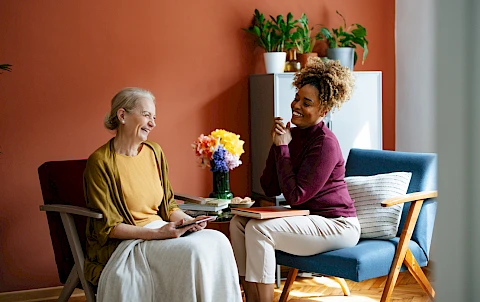
Talking to our senior loved ones about their hygiene and health can be a delicate matter, but it's a conversation that can help ensure their well-being. Still, it's not always easy to know where to start. Many families face these challenges as they navigate this sensitive topic. We'd like to help you open up the conversation with empathy and understanding.
Why You Need to Have This Conversation
As our loved ones age, they might encounter various health and hygiene issues. Problems such as difficulty in maintaining personal hygiene, neglecting nutrition, or skipping regular health check-ups are common among seniors. Having a conversation about these issues is vital for their well-being and can help prevent more serious health problems in the future. If you notice signs like unkempt appearance, forgetfulness about medication, or withdrawal from social activities, it's time to address these concerns.
Preparing for the Conversation
Before you bring up the subject with your loved one, take some time to prepare yourself emotionally and mentally. Being in the right frame of mind can make a big difference. Choose a time and place where you can talk privately without distractions. It can be helpful to gather some information and resources ahead of time that can support your points. This preparation will help you approach the conversation with confidence and sensitivity.
Starting the Conversation
When you're ready to talk, begin with a gentle approach. You might say something like, "I've noticed some changes lately, and I care about your health and happiness." Use a calm and compassionate tone, and prioritize active listening. It's important to express your concern without sounding accusatory. Phrases like "I understand this might be difficult" can show empathy and respect for their feelings.
Key Talking Points
During the conversation, address the key areas of concern:
- Personal hygiene: Discuss the importance of maintaining cleanliness to prevent infections and improve self-esteem.
- Nutrition: Discuss the importance of a balanced diet in supporting overall health and vitality.
- Health check-ups: Regular visits to the doctor can catch potential health issues early on.
Consider discussing mobility challenges and whether they might benefit from assistance with medication management. Emphasize that mental health and social interaction can greatly impact their quality of life.
Handling Emotional Reactions
It's common for seniors to react defensively or resist the conversation. If this happens, try to remain calm and patient. Avoid raising your voice or becoming confrontational. Reinforce the positivity of the discussion by focusing on your shared goal of improving their well-being. Understanding their emotions and maintaining an open dialogue are crucial for nurturing your relationship.
Introducing Support Options
Sometimes, professional help can make a big difference. You might suggest the benefits of having caregivers who are trained to assist with personal care services. This can enhance their independence while ensuring their health needs are met. Present these options as supportive aids rather than intrusive measures, reinforcing their role in improving the senior's quality of life.
Trust Senior Helpers for Compassionate Personal Care
Having open discussions about health and hygiene is essential for the well-being of your senior loved ones. It's important to approach these conversations with care and empathy, setting the foundation for a supportive environment. Remember, taking the first step can make a significant positive impact.
If your loved one could benefit from personal hygiene care, nutritious meal preparation, and even transportation to and from important appointments, contact us at Senior Helpers Vancouver. We proudly serve the Champlain Heights, Dunbar Southlands, Killarney, Kitsilano, and Fairview areas.